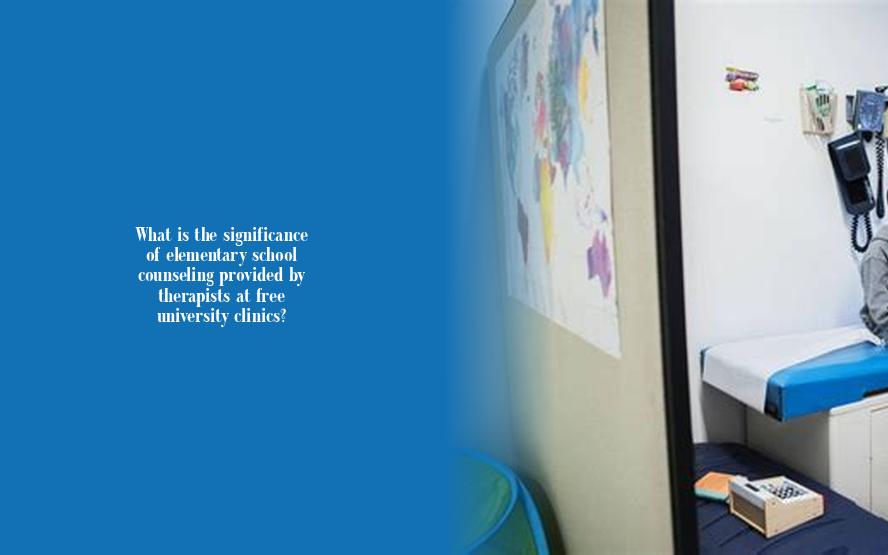Understanding the Role of Therapists in Free University Clinics
Ah, the world of therapy at a free university clinic treating elementary school children – it’s like diving into a box of assorted chocolates, never knowing what you’re gonna get next! Let’s unravel the mystery behind the therapist at a free university clinic treating these young minds with behavior problems referred by a social service agency.
Now, imagine being in the shoes of this therapist. Picture yourself in a cozy office filled with colorful toys and bean bags, where little ones come bouncing in with their bundles of energy and occasional tantrums. The atmosphere is warm and inviting, just like your favorite cafe on a rainy day.
So, what exactly goes on in these therapy sessions? Well, our therapist plays the role of a guiding light for these elementary school children navigating through behavioral challenges. It’s like being the Sherlock Holmes of emotions, deciphering each child’s unique puzzle to help them thrive in their daily lives.
Pro Tips: The therapist uses a mix of play therapy, cognitive-behavioral techniques, and maybe even some arts and crafts to connect with these young clients on their level. It’s all about creating a safe space where they can express themselves freely.
Now, let’s talk about informed consent – it’s like giving someone directions before they embark on a journey. In this setting, ensuring that parents or guardians understand the therapy process for their children is crucial. Think of it as obtaining permission slips before a school field trip; you want everyone on board and informed every step of the way.
Have you ever wondered about the challenges therapists face in such clinics? Imagine balancing limited resources with an endless stream of young minds seeking support. It’s like juggling colorful balloons while walking on a tightrope – exhilarating yet demanding!
So, dear reader, are you ready to dive deeper into this captivating world of therapy at free university clinics? Stay tuned as we uncover more insights and explore the inner workings of this vital profession. Time to strap on your curiosity boots and join us on this enlightening journey ahead!
| Topic | Therapist at a free university clinic treating elementary school children |
|---|---|
| Referral Source | Social service agency |
| Population | Children with behavior problems |
| Setting | University clinic |
| Consent Requirement | Disclosure of information, competency, voluntary decision |
| Relationship to IRB | IRB set up by the institution involved in clinical research |
The Importance of Providing Elementary School Counseling in University Clinics
Elementary school counselors play a crucial role in shaping young minds and providing support tailored to their emotional and educational needs. These compassionate professionals are akin to emotional sherpas guiding students through the peaks and valleys of their academic and personal growth.
These counselors wear multiple hats, from being the “emotions teachers” who help children understand and manage their feelings to collaborating with teachers, parents, and school staff to address a spectrum of social, emotional, behavioral challenges. Think of them as the Swiss Army knives of the school support system – versatile, resourceful, and always ready to lend a helping hand.
Their daily routine can be compared to orchestrating a symphony where they harmonize guidance lessons, social-emotional learning initiatives, individual counseling sessions, and group interventions to ensure every student has the tools they need to thrive academically and emotionally. It’s like conducting an orchestra where each note (or student) plays a vital role in creating a melodious educational experience.
By fostering a safe space for self-expression, advocating for students’ needs, implementing behavioral interventions, promoting social-emotional development, and enhancing access to opportunities for all students regardless of background or circumstance – elementary school counselors truly stand at the frontline of creating an inclusive environment where every child can flourish.
Did you know that pursuing a career in school counseling opens up a diverse range of opportunities beyond traditional school settings? Besides working within the education sector, school counselors can explore roles in health and wellness centers, consulting firms, publishing companies, or even launch their own innovative ventures. With a unique blend of creativity, innovation, and passion for creating positive change in children’s lives – the field of school counseling offers endless possibilities for those dedicated to making a difference.
Dr. DeRaedt highlights that embracing a career path in school counseling allows you to be at the forefront of shaping future generations by providing essential emotional regulation skills, supportive environments for growth, and valuable psychoeducation. It’s like being part of a transformative movement that empowers young minds to navigate life’s challenges with resilience and confidence.
So if you’re someone who thrives on making meaningful connections with others, enjoys being a pillar of support during times of uncertainty or distress – then stepping into the world of elementary school counseling might just be your cup of tea! Join this dynamic profession where every day brings new opportunities to make a lasting impact on young hearts and minds.
- Therapists at free university clinics play a crucial role in treating elementary school children with behavior problems referred by social service agencies.
- Therapy sessions for these young clients often involve play therapy, cognitive-behavioral techniques, and creative activities to create a safe space for expression.
- Informed consent from parents or guardians is essential in this setting to ensure everyone understands and supports the therapy process for the children.
- Therapists in such clinics face the challenge of balancing limited resources with the high demand for support from young minds, making it a demanding yet vital profession.

